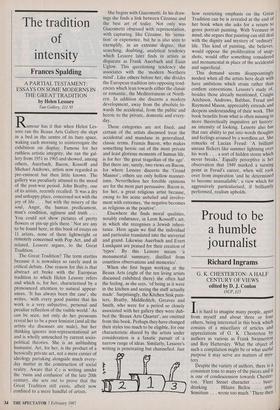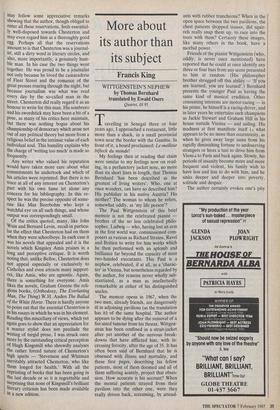Proud to be a humble journalist
Richard Ingrams
G. K. CHESTERTON: A HALF CENTURY OF VIEWS edited by D. J. Conlon
OUP, £15
It is hard to imagine many people, apart from myself and about three or four others, being interested in this book which consists of a miscellany of articles and appreciations of G. K. Chesterton by authors as various as Frank Swinnerton and Roy Hattersley. What the object of such a compilation might be or what useful purpose it may serve are matters of mys- tery. Despite the variety of authors, there is a consistent tone to many of the pieces and it is one of condescension towards Chester- ton. 'Fleet Street character . . . beer- drinking . . . Hilaire Belloc . . . anti- Semitism . . wrote too much.' There then may follow some appreciative remarks showing that the author, though obliged to enter all these reservations, feels essential- ly well-disposed towards Chesterton and may even regard him as a thoroughly good egg. Perhaps all that the reservations amount to is that Chesterton was a journal- 1st, still a dirty word in literary circles, and also, more importantly, a genuinely hum- ble man. In his case the two things went together. He was proud to be a journalist not only because he loved the camaraderie of Fleet Street and the romance of the great presses roaring through the night, but because journalism was what was read every day by the so-called man in the street. Chesterton did really regard it as an honour to write for this man. His sombrero and his swordstick may have been a bit of a pose, as many of his critics here maintain, but there was nothing bogus about his championship of democracy which arose not out of any political theory but more from a religious belief in the intrinsic value of each individual soul. This humility explains why the charge of 'writing too much' is made so frequently.
Any writer who valued his reputation would have taken more care about what commitments he undertook and which of his articles were reprinted. But there is no trace at all of any interest on Chesterton's part with his own fame let alone any concern for his bibliography. In this re- spect he was the precise opposite of some- one like Max Beerbohm who kept a watchful eye on all such things, and whose output was correspondingly small.
Of the critics quoted, many, like John Wain and Bernard Levin, recall in particu- lar the effect that Chesterton had on them when they were schoolboys. In each case it was his novels that appealed and it is the novels which Kingsley Amis praises in a long and perceptive critique. It is worth noting that, unlike Belloc, Chesterton does not appeal especially or exclusively to Catholics and even attracts many support- ers, like Amis, who are agnostic. Again, there is something for everyone. Amis likes the novels, Graham Greene the reli- gious books, (Orthodoxy, The Everlasting Man, The Thing) W.H. Auden The Ballad of the White Horse. There is hardly anyone to point out that the essential Chesterton is In his essays in which he was in his element. Reading this miscellany of views, which yet again goes to show that an appreciation for a master stylist does not preclude the writing of turgid prose, I was struck once more by the outstanding critical perception of Hugh Kingsmill who shrewdly analyses the rather forced nature of Chesterton's high spirits — 'Stevenson and Whitman inevitably attracted Chesterton, who like them longed for health.' With all the reprinting of books that has been going in the last decade or so it is regrettable and surprising that none of Kingsmill's brilliant literary criticism has been made available in a new edition.



















































 Previous page
Previous page